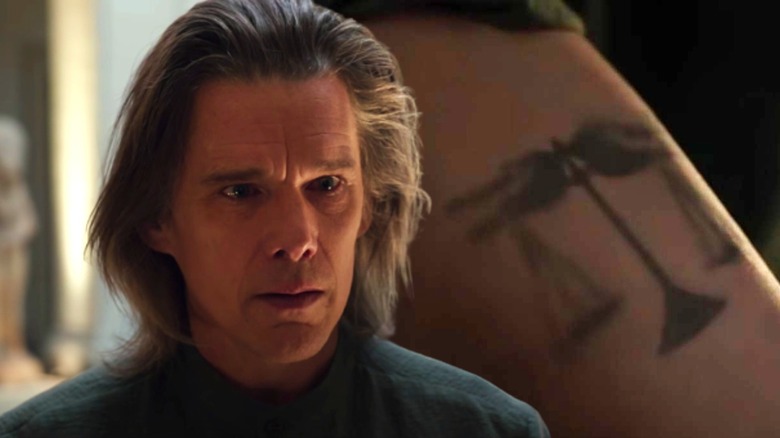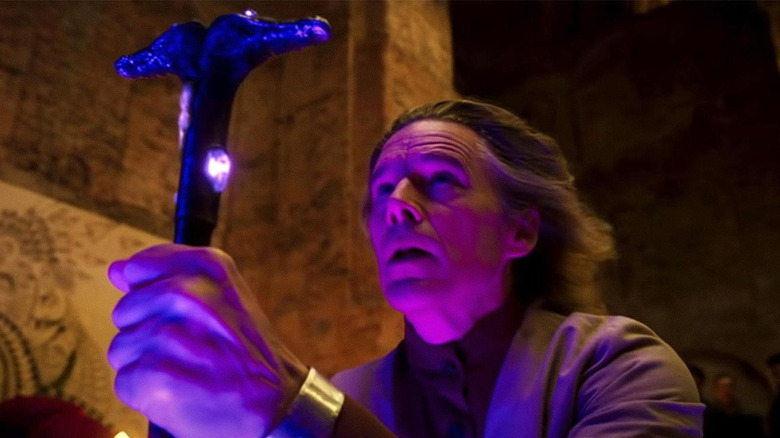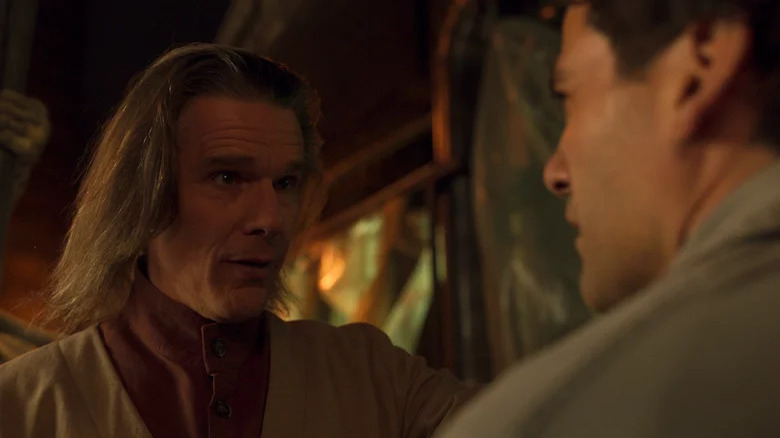The Significance Of The Scale Tattoo In Moon Knight
Warning: major spoilers ahead for episode 1 of "Moon Knight."
The first episode of Marvel's highly-anticipated limited series, "Moon Knight," just dropped, introducing the titular hero Marc Spector/Steven Grant (Oscar Isaac) and cult-leader villain Arthur Harrow (Ethan Hawke). The "Moon Knight" narrative is based around Egyptian mythology and lore, as the key tenet of Marc's character is that he is the avatar of the Egyptian moon god, Khonshu.
Khonshu will obviously not be the only Egyptian deity of note in the series, as episode 1 also offered a glimpse into Ammit, or Ammut, a demoness in ancient Egyptian religion, to whom Harrow and his cult are devoted. While Ammit/Ammut has not been shown on-screen as of yet, she is traditionally represented as a humanoid crocodile in the "Moon Knight" comics.
Harrow's actions are still shrouded in mystery, glimpsed first in the opening moments of the episode, wherein he is seen to be carrying out a ritual involving corporal mortification of sorts. He uses his cane, which has been spotted numerous times in the many trailers and TV spots for the show, replete with two crocodile heads facing away from each other.
After Harrow's reveal to Steven that he needs the scarab as a means to resurrect Ammit, it becomes clear that he is acting as the Egyptian deity's vessel, hell-bent on actualizing her vision of justice through the power granted to him. The scale tattoo on Harrow's arm becomes pivotal, but what does it signify within the ambit of "Moon Knight"?
Playing judge, jury, executioner
Steven first encounters Harrow and the immeasurable power of the scale tattoo on his forearm after he accidentally falls asleep, which is essentially when his Marc Spector persona takes over (although he is not aware of this at the time). Baffled at the fact that he has somehow managed to sleepwalk his way to the countryside, Steven sees Harrow's men follow him menacingly, which forces him to try and mingle with the crowd of cult members, who watch Harrow enact Ammit's judgment on an elderly member.
The scales are a physical manifestation of Ammit's judgment of souls that are "worthy" and those that are not — Harrow uses them to decide a person's fate, based on whether they might commit acts of evil in the future. This preemptive (and extremely skewed) brand of justice is witnessed by Steven firsthand, after Harrow kills a fellow cult member after the scales decides that her soul is not worthy, based on the assumption that she is capable of committing evil deeds in the future. While Ammit is not as prominent as the other Heliopolitan race of gods in the "Moon Knight" comics, she emerges as a major catalyst for the plot in the TV series, and her religio-cultural roots become integral to Harrow's motivations.
From the point of view of Egyptian mythology and ancient religion, Ammit lived near the scales of justice in Duat, the Egyptian underworld, playing an important role in the weighing of souls after their death, a process overseen by Anubis. If the deceased individual's soul was deemed pure, they would travel to the underworld towards Osiris, and if not, their hearts would be devoured by Ammit herself, destroying their souls from within. "Moon Knight" adopts this aspect associated with Ammit and applies it within a modern context: Harrow, Ammit's avatar, uses the scale tattoo to judge souls, letting them go or condemning them to death as per the results.
The problematic implications of Harrow's motivations are dire, as he intends to unleash Ammit on our corporeal world with the help of the coveted scarab, which Steven/Marc has on his person in episode 1 of the show.
A flawed, harmful idea of justice
A fight ensues between Steven and Harrow's men, who intend to pry off the scarab from him, as it is an ancient artifact that points towards Ammit's tomb, which Harrow is in search of for the purpose of resurrecting the deity. While the full extent of Harrow's powers have not been explored in episode 1 of "Moon Knight," the power of the scales alone is terrifying, as it allows the character to enact a twisted idea of justice as he sees fit. Marc's persona has also not been formally introduced yet, except at the end when Steven allows him to take over his body to fight the Egyptian jackal unleashed on him by Harrow inside the museum.
Ammit's eventual resurrection directly usurps Khonshu's idea of vengeance, as the polarizing moon god channels his idea of rightful justice through Marc, who punishes those who have actively committed acts of evil. Also, while it is too early to speculate the direction into which the series will veer, the other members of the Celestial Heliopolis cannot to too pleased with Harrow's plan, as it directly shatters the equilibrium established on Earth and the various pocket dimensions.
Moreover, there is a reason why Ammit was not worshipped, but feared, by ancient Egyptians, as the act of devouring a soul would condemn it to eternal restlessness, a fate worse than death. Steven finds himself inadvertently embroiled in these dire matters (poor soul has no idea what is going on), while be battles his paranoia about hearing a voice inside his head, unsure whether his waking nightmares are real or not. This dilemma, however, is put to rest by Harrow himself after he visits Steven in the museum, explaining his grand plan of evil being "eradicated" once he resurrects the crocodile goddess. As seen in the official trailer for the series, Harrow attempts to decide Steven/Marc's fate via the scale tattoo, but is unable to come to a conclusion as the scales violently oscillate between both outcomes, highlighting the schism in his psyche and the chaos inherent within his soul.
There's undoubtedly more to come in terms of Harrow flexing his scale tattoo, and the consequences might be jarring, as his (and Ammit's) arbitrary idea of nipping evil in the bud is bound to bring more death, destruction, and chaos. Now it's up to Steven and his alters to stop Harrow from materializing his ambitious, misguided plan.
Episode 1 of "Moon Knight" premiered on March 30, 2022, exclusively on Disney+.


